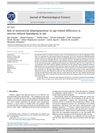 May 2024 in “International Journal of Nanomedicine”
May 2024 in “International Journal of Nanomedicine” Biodegradable polymers can improve cannabinoid delivery but need more clinical trials.
 13 citations,
April 2022 in “Anais brasileiros de dermatologia/Anais Brasileiros de Dermatologia”
13 citations,
April 2022 in “Anais brasileiros de dermatologia/Anais Brasileiros de Dermatologia” The document concludes that more research is needed to find effective treatments for Lichen planopilaris and Frontal fibrosing alopecia.
 22 citations,
May 2011 in “American Journal of Clinical Dermatology”
22 citations,
May 2011 in “American Journal of Clinical Dermatology” Recognizing and managing skin-related psychiatric disorders in children is crucial for effective treatment.
 9 citations,
July 1995 in “Veterinary Clinics of North America: Small Animal Practice”
9 citations,
July 1995 in “Veterinary Clinics of North America: Small Animal Practice” The document concludes that hair loss in cats is caused by various factors, including allergies, mites, infections, and hormonal issues, with treatments varying accordingly.
 May 2019 in “Gastroenterology”
May 2019 in “Gastroenterology” Androgen lowering medications don't significantly change HCV-related liver cancer risk in men.

Iron deficiency anemia can cause itching, which often improves with iron supplements.
 107 citations,
December 2003 in “Dermatologic Therapy”
107 citations,
December 2003 in “Dermatologic Therapy” Interferon, especially alfa interferon, is an effective treatment for cutaneous T-cell lymphoma with manageable side effects.
 April 2023 in “JOJ dermatology & cosmetics”
April 2023 in “JOJ dermatology & cosmetics” The conclusion is that a team of skin doctors and psychiatrists is needed to better treat patients with mind-skin disorders.
 258 citations,
July 2016 in “Reproductive Biology and Endocrinology”
258 citations,
July 2016 in “Reproductive Biology and Endocrinology” The document concludes that insulin resistance is key in PCOS development and early treatment is crucial to prevent complications.
 4 citations,
November 2018 in “Journal of pharmacological sciences”
4 citations,
November 2018 in “Journal of pharmacological sciences” Mild exercise reduces pain in older rats through a brain chemical, while intense exercise reduces pain in all rats through a different pain-blocking process.
88 citations,
April 2012 in “Journal of Investigative Dermatology” Blocking TRPV3 may help treat itch in dry skin conditions.
 38 citations,
April 2018 in “Psychopharmacology/Psychopharmacologia”
38 citations,
April 2018 in “Psychopharmacology/Psychopharmacologia” Blocking CRF-R1 can reduce alcohol intake in stressed mice.
111 citations,
August 1998 in “Journal of Investigative Dermatology” μ-opiate receptors in skin cells may affect skin health and healing.
 15 citations,
May 2007 in “Hormones and Behavior”
15 citations,
May 2007 in “Hormones and Behavior” Finasteride boosts morphine's pain relief, stops tolerance, and reduces withdrawal in rats.
 3 citations,
January 2010 in “Actas Dermo-Sifiliográficas”
3 citations,
January 2010 in “Actas Dermo-Sifiliográficas” Psychotropic drugs can help treat skin conditions affected by mental health, but dermatologists must use them carefully due to side effects and patient concerns.
 506 citations,
January 2012 in “Molecular and Cellular Endocrinology”
506 citations,
January 2012 in “Molecular and Cellular Endocrinology” Melatonin affects many body functions beyond sleep by interacting with specific receptors in various tissues.
 1 citations,
June 2019 in “Innovare journal of medical sciences”
1 citations,
June 2019 in “Innovare journal of medical sciences” Polycystic Ovary Syndrome (PCOS) is a hormonal disorder in women that can cause infertility and other health issues, and it may be improved by treatments that increase insulin sensitivity.
 March 2017 in “Fundamental & Clinical Pharmacology”
March 2017 in “Fundamental & Clinical Pharmacology” The model and estimator can predict drug exposure in kidney transplant patients well.
 1 citations,
January 2012 in “Elsevier eBooks”
1 citations,
January 2012 in “Elsevier eBooks” The document concludes that the skin is a complex organ providing protection, sensation, and healing, with challenges in treating conditions like itchiness.
 37 citations,
April 2019 in “Journal of The American Academy of Dermatology”
37 citations,
April 2019 in “Journal of The American Academy of Dermatology” Some treatments like intralesional steroids and 5α-reductase inhibitors are effective for frontal fibrosing alopecia, but more research is needed.
 November 2024 in “Frontiers in Medicine”
November 2024 in “Frontiers in Medicine” Cirrhosis affects quality of life with various symptoms, requiring a holistic, multidisciplinary approach for management.
 11 citations,
January 2016 in “Journal of clinical & experimental dermatology research”
11 citations,
January 2016 in “Journal of clinical & experimental dermatology research” Substance abuse can cause various skin problems, including marks from injections, sores, premature aging, and increased cancer risk.
61 citations,
October 2011 in “Experimental dermatology” Scalp itching is common and hard to diagnose due to the complex nerve structure of the scalp.
 January 2012 in “Elsevier eBooks”
January 2012 in “Elsevier eBooks” New treatments for skin and hair repair show promise, but further improvements are needed.
 15 citations,
June 2019 in “Experimental Dermatology”
15 citations,
June 2019 in “Experimental Dermatology” Old neuropharmacological drugs might be effective for treating inflammatory skin diseases.
 3 citations,
October 2023 in “Military Medical Research/Military medical research”
3 citations,
October 2023 in “Military Medical Research/Military medical research” Regulatory T cells help heal skin and grow hair, and their absence can lead to healing issues and hair loss.

Chemotherapy can cause skin issues and hair loss, and this guide explains how to manage them.
3 citations,
July 2023 in “International journal of molecular sciences” Stress may contribute to hair loss in alopecia areata by affecting immune responses and cell death in hair follicles.
 4 citations,
January 2019 in “Dermatology Online Journal”
4 citations,
January 2019 in “Dermatology Online Journal” Low-dose naltrexone might be a cheap and effective additional treatment for hair loss with scalp discomfort due to its anti-inflammatory effects and few side effects.
 11 citations,
March 2017 in “Journal of Biomedical Semantics”
11 citations,
March 2017 in “Journal of Biomedical Semantics” The Drug Ontology was updated to better classify drugs for hypertension, malaria, and opioid abuse, and to allow for more accurate research queries.


























